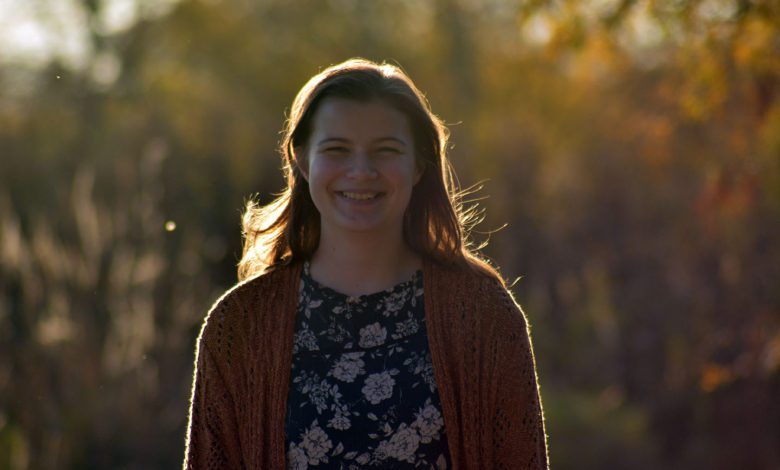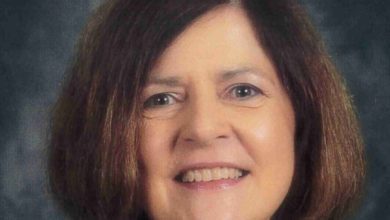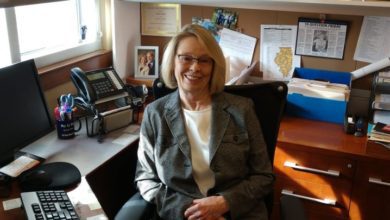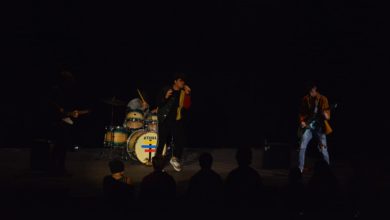Tietz named Salutatorian of Mahomet-Seymour Class of 2021

By FRED KRONER
Some students – regardless of the school – find their way to the principal’s office more frequently than others.
For the vast majority, however, interactions with the principal are limited to a chance meeting in the hallway during passing periods or in the commons area before school or in the cafeteria at lunchtime.
It was in the casual environment that Mahomet-Seymour principal Chad Benedict had occasion to interact with Ella Tietz, one of 200 members in the upcoming graduating Class of 2021.
He was impressed.
“The thing I remember, walking in the hallway, I would always see the smile,” Benedict said. “Some kids feel awkward if you say ‘Hi.’ Her reaction goes a long way for other students to see.”
Tietz is not the boisterous person whose attitude demands attention.
Nor is she the super-athlete who seemingly always finds her way to newspaper headlines or photographs.
She is the person, though, who would arrive at school not thinking about how many hours it is until she can leave, but what she might learn that day.
“Ella is a quiet lead-by-example person for doing what you need to do to be successful,” Benedict said.
Her learning didn’t stop on the official final day of classes for seniors, Friday, May 14. Five days later, she was gaining more knowledge.
That Wednesday was when she learned her body of work during her four years warranted status as Mahomet-Seymour salutatorian for the Class of 2021.
“I was very shocked when I found out,” Tietz said. “It wasn’t on my radar to be in the top two. I was mostly shooting for the Top 10.”
The Top 10 was a specific goal since her freshman year.
“As someone who has a last name near the end of the alphabet and who has suffered the effects of alphabetical order all year, I was very excited when I saw during graduation band my freshman year that the Top 10 got to graduate out of alphabetical order,” Tietz said, “and I set a goal for myself to be in the Top 10 because of the alphabetical reason, and also because I like to have a challenge.”
She made a quantum leap in the past 12 months. Tietz said her class rank was 12th after her junior year and fifth after the first semester of her senior year.
“It probably isn’t usual for such a big jump for the final year,” Tietz said, “but since our GPA didn’t count second semester of junior year, that is why my rank was a bit lower coming into this year than the salutatorian normally has.”
In her four years of classroom work, Tietz had all A’s (four were A-minuses) except for a B-plus in one class during the first semester of her junior year.
She is thankful for the instructors she had at M-S, though she said not all of her role models were adults.
“All of my teachers have been really great and I am grateful that they have taught me so well,” Tietz said. “My peers have also been a role model for me because seeing other people working really hard made me realize I was slacking, so they helped me to focus more.”
***
The past 15 months have served as a learning experience for students nationally as COVID-19 has created crash courses on how teachers are to instruct their students.
“The pandemic impacted every student in some way or another,” Benedict said.
Tietz believes the effect was positive for her. For nearly a year and a half, she was not inside a classroom, except for extra-curricular activities or meetings.
There was one exception. She finished her high school career in the same building where she started it.
“On the last day of school (Friday, May 14), one of my other remote friends and I went for one in-person day,” Tietz said. “It wasn’t actually a day where we learned anything as we had already finished most of our AP tests.”
As a member of Marching Band, Jazz Band, Mad Brass, ILMEA, Solo and Ensemble, Scholastic Bowl, Math Team and WYSE Team, Tietz had other occasions to be on the school grounds as a senior.
“I did go to the school for activities, so I wasn’t completely isolated or anything,” she said, “and there were also some classes that occasionally held optional reviews before school that I attended, but as for the actual school day, I logged onto Google Meet.”
She thrived in the individual learn-at-home environment. She recognizes that the newly introduced concept was not beneficial for everyone.
“This is probably the opposite for most people, but I found remote learning to be a lot easier,” Tietz said. “Starting with the spring of 2020, we didn’t have grades (for one semester), but we still had the AP (Advanced Placement) tests.”
Those students taking AP courses had to remain diligent in their studies. The year-end AP exams help determine how much college credit the student will receive, or at what level they might enter in particular subjects.
For some students, this was an island. For others, an oasis.
“I would say that month or two leading up to those tests when we were out of school (in 2020) was when I really learned how to study,” Tietz said. “I essentially made a schedule for what practice tests I was going to do and what topics I would review and I followed it to the dot, and it was really rewarding when my scores came back, because I worked really hard for them.”
After a two-month summer break to recover from the stress of the final weeks of her junior year, Tietz approached her final year in high school with a renewed vigor.
“I was super motivated to get my class rank up, so in the fall I kept super organized and always wrote down what I was going to do each day,” she said. “For the first semester this year, I studied really hard for my classes and even stayed up pretty late each night studying.”
Tietz credited the hybrid learning approach along with the pause on many activities as reasons she was able to improve her grade-point average.
“Remote learning really helped me to keep my grades up for a lot of reasons,” she said. “First, in a normal year, I participate in a lot of extra-curricular activities with practices after school and competitions on a lot of the weekends.
“That was greatly reduced this year and so I had a ton of extra time. I also had a lot of extra time during the day in the first semester due to how the alternating schedule worked, so every other day I would get a study hall in a few classes.”
The aspect she liked best was the ability to establish a schedule that best-suited her needs and didn’t deprive her of sleep.
“The greatest advantage for me,” Tietz said, “was that instead of waking up at 7 every morning, I could wake up at 9:30, roll out of bed and log onto my class.
“I was able to get a lot more sleep than I would have otherwise because the rigor of my schedule caused me to stay up until about midnight, or later, every night. Normally that means I would get about seven hours of sleep, but instead I got nine this year. For this semester, I definitely had senioritis, but I still thought it was easier with the reduced activities to keep my grades up.”
Those thoughts represent her thank you for the unintended consequences of the coronavirus pandemic.
“I would definitely not be in this position (top two in the senior class) if COVID didn’t happen,” Tietz said. “I found remote learning to be a lot less stressful than a normal year, and I also was able to get a lot more sleep and a lot more time to study.”
She found that teachers were not only on board with the remote learning, but also provided welcome opportunities for the students to work at their own speed.
“There were some classes that posted all the material for a unit,” Tietz said, “so it was easy to get ahead on the weekends.
“For example, for calculus in the first semester, I would usually finish the work for the week on the weekend so I didn’t have to worry about it during the week.”
Tietz’ study habits underwent a transformation following her sophomore year. Even thereafter, she found her regime to be a work-in-progress.
“In my freshman and sophomore years I didn’t study very much outside of doing homework, but things got a lot harder in my junior year, so I sort of had to learn how to study then,” she said.
Her late nights, she acknowledged, weren’t always strictly devoted to book work.
“I didn’t really keep track of how many hours, but I would stay up until about midnight every day on average, but it’s not like I studied that whole time,” Tietz said. “I would do a good balance of studying and relaxing.
“I also have a bad habit of watching TV while I study, so I wasn’t always super-productive.”
She took three AP classes as a junior and five more as a senior. The goal in doing so is to get a head start on the college experience. Her Advanced Placement course load included U.S. History, Chemistry, Biology, Computer Science Principles, Calculus, Physics, English and Economics.
“I will hopefully be able to test out of quite a few classes, which is really nice because they are some of my first-year requirements in college,” Tietz said.
***
Kay Coulson has random memories of Ella Tietz, a first-grader she taught at Sangamon School in 2009-10.
“When she grew up, she wanted to have her own restaurant called THE OAKS,” Coulson recalled. “It was going to have different floors.
First-graders don’t always conduct themselves like mature adults. Tietz’ first-grade behavior, however, was beyond her years.
“She was quiet and very well-behaved,” Coulson said. “She was conscientious and always did neat quality work.”
There were particular areas, Coulson said, where the youngster flourished.
“She was an amazing writer,” Coulson said. “She always had something to write about and was very creative. I loved to see what she would create and write when we did Squiggles during writing time. I loved having Ella in my first-grade class.”
The creativity carried over to her Halloween costume.
For Halloween, she was – naturally – Superella, “with a cool costume,” Coulson said.
Fast forward 12 years. One of the M-S high school instructors who taught Tietz this year in mathematics was Eric Potter. The maturity was still evident.
“A lot of people who chose remote learning did it for the wrong reasons,” Potter said. “They thought it was a vacation.
“When I talk about the success stories with remote learning, I use Ella’s name. She was able to do it on her own. She’s the kind of person who gets things done.”
Tietz took the process seriously and paid attention to detail.
“She was on every Google Meet and handed in every assignment on time,” Potter said. “She did as well as she would have in class.
“She was interested in learning and put in the time, even if someone wasn’t looking over her shoulder.”
***
She plans to major in engineering with an eye to ultimately make a difference in the world.
“At this point, I am planning on doing Environmental Engineering,” she said. “Engineering because I really like math, and Environmental because I feel like as a society, we need to really focus on helping the climate crisis.
“I am really passionate about that, so I figured I would base my career on it as well. Hopefully, in 10 to 15 years I will have a job that I like and be surrounded by people I like and relate to, and hopefully, humans will have not gone extinct by then.”
Tietz enjoyed numerous classes over the years – including Algebra 2 Honors, Government and Law 2, AP U.S. History, AP Physics, AP English and Brit Lit – but said her favorite subject for years has been mathematics.
“If I didn’t want to go into engineering, I think I would do math,” she said. “I have always been pretty good at math, and I really like it because it is like a puzzle.
“You have to recognize each situation and then apply what you know. It is not just, ‘oh yeah this is the one thing you have to do,’ there are a ton of different situations.”
She traces her interest in the subject back to her grade school years.
“One of my favorite memories from math was in elementary school in the enrichment math class when we got to play sudoku,” Tietz said. “I think that’s the start of my love for math and strategic thinking.”
In recent years, M-S graduations have been held in Urbana at the Krannert Center. COVID-19 forced an alternate site in 2020, and again this year. The May 28 graduation will take place at M-S High School.
Tietz had two years to experience the Krannert ceremonies upclose as a member of the M-S band, which was onstage throughout the evening.
Her frustration is not that she won’t be able to receive her diploma at the iconic facility, but that others won’t have the same enjoyable opportunity she experienced.
“I am grateful that I was able to play on the Krannert stage, but actually not graduating on it wasn’t something that disappointed me,” Tietz said. “I feel bad for the students who don’t get to play on it because the way it makes you sound is just so satisfying.
“Since the seniors last year didn’t graduate on it either, I didn’t really think about graduating on it since it hasn’t happened for two years at this point.”
***
Music has been a part of Tietz’ life for more than a decade. She started playing piano in first grade and trombone in fifth grade.
She continued with it because it provided a nice diversion to her daily routine.
“Music is so different from standard academics,” Tietz said. “I think it really helped me think about things in a different way, which is always a benefit because the more ways people can look at a problem, the better solution is going to come out.
“I really like also being able to pick up my trombone each night and just play and take a break from school while still being productive. Music has always provided a different sort of learning for me.”
The commitment to band at M-S requires a significant investment of time.
“Band is a year-round activity for me because I participate in a lot of different ensembles, and I also take private lessons, so I have to keep up my practice,” Tietz said. “Band combined with school definitely is what taught me time management.
“In my height of practicing, I probably did practice almost every day, which is just another thing on top of all the homework. This taught me to plan out my days to make sure I got in at least some practice.
“And then also I had practices for Marching Band, Jazz Band, Mad Brass, and Pit after school throughout the year which would go until about 5:30, so I also had to consider that with how much time I had to study.”
Like in academics, Tietz was rewarded for her efforts and dedication with high recognition.
As a junior, she was selected for All-State band. She also had the opportunity to play a solo in Marching Band. Also as a junior in Jazz Band, the trombone section was named soloist of the day at one of the competitions Mahomet-Seymour attended.
Tietz was a part of successful academic teams as well, including a state-placing Chem Team and a state-placing WYSE team.
Additionally, she was a member of the Math Team, which won four regional titles during her tenure. Those teams went on to win state her sophomore and senior years (with the junior state meet canceled by COVID-19). Tietz was an individual state-placer (fifth) as a sophomore.
Graduation won’t quite complete the book on Tietz’s high school activities.
She was a member of the two-time regional championship M-S Scholastic Bowl teams in 2020 and 2021. The season ended prematurely (thanks to COVID) her junior year, but not this spring.
“We will be competing in a national tournament the weekend after the graduation ceremony,” Tietz said.





